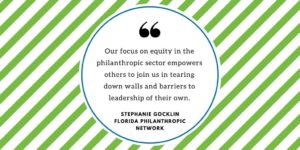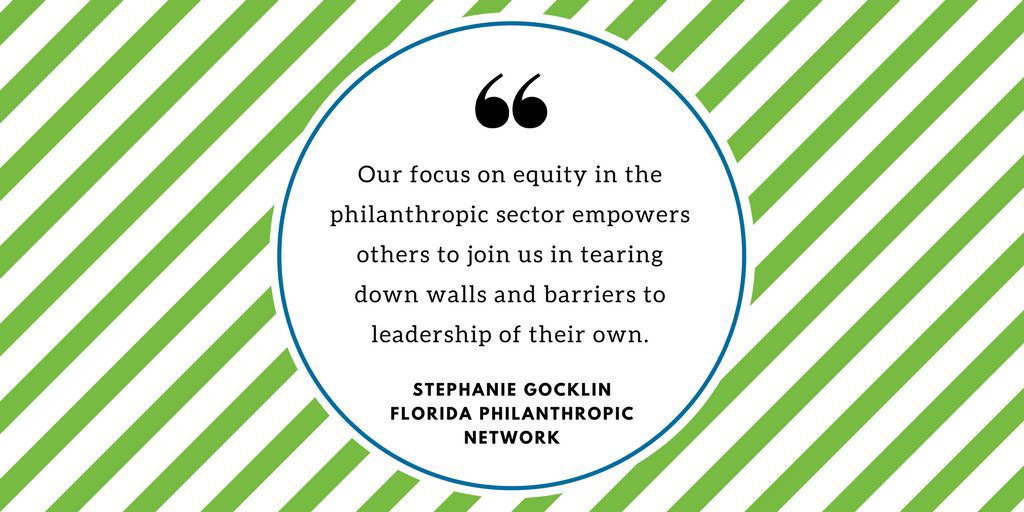This post originally appeared on the United Philanthropy Forum blog here.
At this year’s United Philanthropy Forum annual conference in San Francisco, I had the opportunity to take part in the Emerging Practitioners Conversation presented in partnership with Emerging Practitioners in Philanthropy (EPIP). Inside the safe walls of this three-hour workshop, the room filled with honest dialogue, shared struggles and untested ideas for emerging leaders that overflowed into my conversations at the conference.
Many of these conversations grew from our personal accountability for diversity, equity and inclusion in the sector. Are we supporting these values internally as well as supporting our members already involved in this work or just getting started? How can we move from conversations to real change? What does leadership look like at different organizations?
…we can’t program our way to equity, it must be ubiquitous in culture and leadership.
As one leader shared, we can’t program our way to equity, it must be ubiquitous in culture and leadership. I had the honor of meeting and learning from leaders throughout North America from different backgrounds, serving communities diverse in geography, demographics and needs but all sharing a common vision to advance equity in philanthropy. Three approaches resonated with me during my time in San Francisco.
In its most recognizable form, leadership by example spreads strength and courage to those called to act but unsure where to start. Our focus on equity in the philanthropic sector empowers others to join us in tearing down walls and barriers to leadership of their own. No matter where equity efforts begin, the CEO must lead the charge and the board must support the work; this establishes a model of equity for our members, partners and colleagues. When we take the initial steps, we invite others to stand with us.
Sometimes leadership is strongest in the act of listening, including different voices in our conversations and learning from others’ lived experiences. By giving our time and thought to difficult conversations, we establish philanthropy as a sector for all voices, not just those at the top. The privilege of being a white straight cisgender woman is not lost on me; we must all participate in building inclusive environments where our peers can show up authentically and be heard without discrimination. For many of us, our first hints at leadership come from being receptive to other perspectives, building trust and growing relationships on listening actively, carefully and genuinely.
No matter what your position, expertise or professional background, we all have an obligation to support and advance equity in philanthropy.
Other times our leadership style may resemble servant leadership — a practice I unknowingly identified with but only recently came to know by name. Servant leadership examines how to lead those you serve; it requires unselfishly sharing resources, working consciously toward the greater good and fostering emerging practitioners to test their own strengths and leadership capabilities. Driven by ethics, servant leaders shape healthy, vibrant communities by using their leadership to serve others and provide opportunities to identify needs, resources and solutions.
No matter what your position, expertise or professional background, we all have an obligation to support and advance equity in philanthropy. As a communications professional with a stint in workforce development, my personal charge is to take organizational culture off the back burner and find ways to better support emerging leaders. One idea that grew from discussions at the Forum’s conference was an employee values handbook of sorts, a way to help current leaders develop cohesive messages for driving change, identify emerging leaders and promote increased initiative and autonomy through mission alignment, equity efforts and values consciousness. Examining how we can fully live our missions in an environment that requires rapid response to the 24-hour news cycle requires continued reminders about “the why” of our daily work.
Throughout my stay on the west coast, I found myself inspired by our leadership sector advocating for hope, change and equity. Our passions vary – from diversity, equity and inclusion to affordable housing, equitable health care to improved education, environmental justice to civic engagement – but they are intertwined in our shared commitment to a field that, by definition, works tirelessly to help build better communities, support the welfare of others and provide leadership in humanitarian change.
